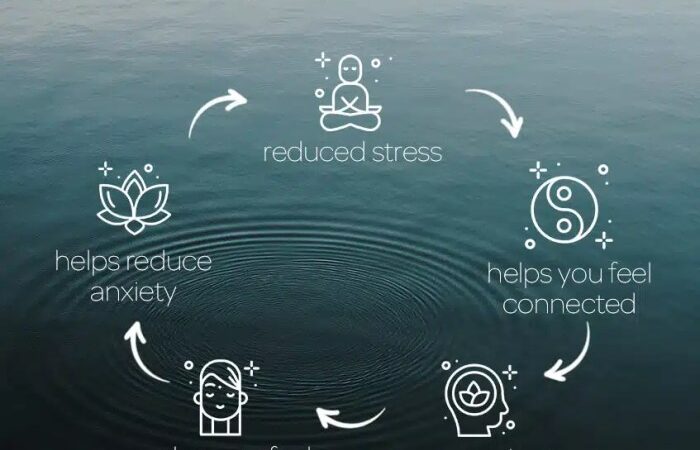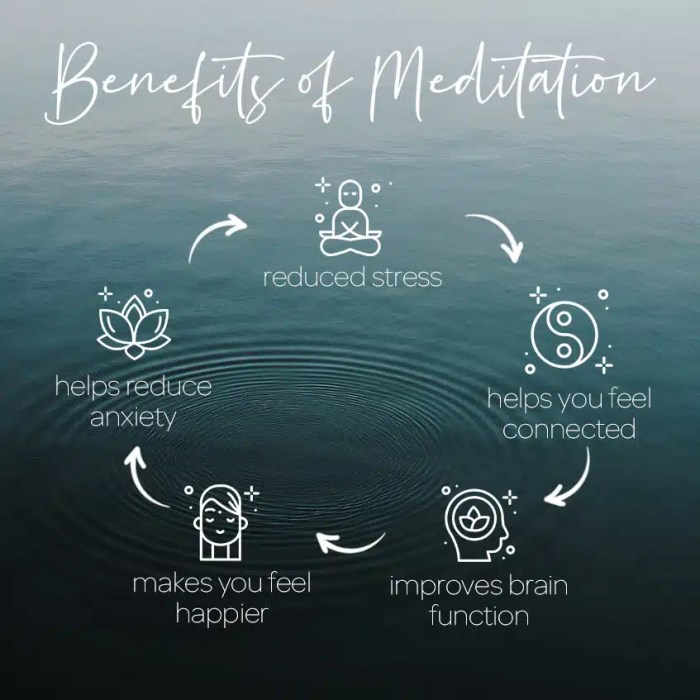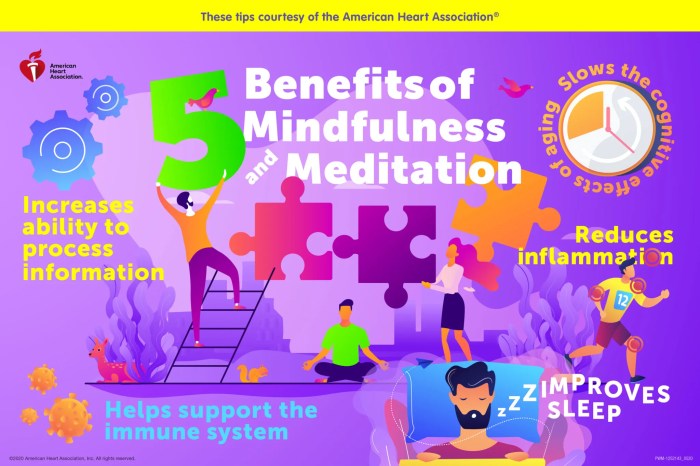Unlocking Lifes Potential: The Benefits of Mindfulness

The benefits of mindfulness are far-reaching, touching upon every aspect of our lives. It’s not just a trendy buzzword, but a powerful practice that can transform our mental, physical, and emotional well-being. Mindfulness, the art of being present in the moment without judgment, allows us to cultivate a deeper connection with ourselves and the world around us.
This profound practice unlocks a wealth of benefits, leading to increased resilience, improved relationships, and a greater sense of peace and purpose.
From reducing stress and anxiety to enhancing focus and creativity, mindfulness offers a transformative path to a more fulfilling and balanced life. By learning to observe our thoughts and feelings without getting caught up in them, we gain a greater understanding of ourselves and develop the ability to respond to challenges with greater clarity and compassion.
Improved Mental Well-being

Mindfulness is a powerful tool for enhancing mental well-being, particularly in our fast-paced and often stressful modern world. By cultivating awareness of the present moment, mindfulness helps us navigate the challenges of daily life with greater clarity and resilience.
Stress and Anxiety Reduction
Mindfulness practices have been shown to effectively reduce stress and anxiety. When we engage in mindfulness, we learn to observe our thoughts and feelings without judgment. This non-judgmental awareness helps us detach from the constant stream of anxious thoughts that can plague our minds.
Research suggests that mindfulness-based interventions, such as meditation, can significantly reduce levels of the stress hormone cortisol, leading to a calmer and more balanced state of mind.
Mood Regulation and Emotional Stability
Mindfulness fosters emotional regulation by increasing our awareness of our emotional states. By observing our emotions without getting swept away by them, we gain the ability to manage our reactions and prevent negative emotions from spiraling out of control. This heightened awareness also allows us to identify triggers that lead to emotional distress and develop strategies for coping with them effectively.
Focus and Concentration Enhancement
Mindfulness can improve focus and concentration by training the mind to stay present and engaged. By quieting the constant chatter of thoughts, we create space for greater mental clarity and attention. This ability to focus is essential for academic performance, work productivity, and overall cognitive function.
Mindfulness practices have been shown to improve working memory, attention span, and cognitive flexibility, leading to enhanced mental agility and improved performance in various tasks.
Enhanced Physical Health

Mindfulness practices, beyond their mental benefits, have a profound impact on physical well-being. Emerging research highlights a strong connection between mindfulness and improved physical health, revealing its potential to enhance various aspects of our bodily functions.
Reduced Inflammation
Chronic inflammation is a significant contributor to various health problems, including heart disease, cancer, and arthritis. Mindfulness practices have been shown to reduce inflammation by regulating the body’s stress response. When we are mindful, we become more aware of our physical sensations, including those associated with stress.
This awareness allows us to manage stress more effectively, leading to a decrease in the production of inflammatory chemicals.
A study published in the journal “Psychoneuroendocrinology” found that mindfulness-based stress reduction (MBSR) training significantly reduced levels of inflammatory markers in participants.
Improved Sleep Quality
Mindfulness can help us achieve better sleep quality by promoting relaxation and reducing stress. The practice of mindfulness involves focusing on the present moment and accepting thoughts and feelings without judgment. This non-judgmental awareness helps to quiet the mind, reducing racing thoughts that can interfere with sleep.
A study published in the “Journal of Alternative and Complementary Medicine” found that mindfulness meditation improved sleep quality in individuals with insomnia. Participants reported fewer sleep disturbances and increased sleep duration after engaging in regular mindfulness practice.
Managing Chronic Pain
Mindfulness can be a valuable tool in managing chronic pain. By focusing on the present moment, individuals can shift their attention away from pain and develop a more accepting attitude towards it. This can help to reduce the emotional distress associated with chronic pain and improve overall quality of life.
A study published in the “Journal of Pain” found that mindfulness-based pain management programs significantly reduced pain intensity and improved pain-related distress in individuals with chronic pain conditions.
Improved Relationships

Mindfulness can significantly enhance our relationships by cultivating empathy, compassion, and improved communication skills. This heightened awareness allows us to connect more deeply with others and navigate challenges with greater understanding and grace.
The Impact of Mindfulness on Empathy and Compassion
Mindfulness helps us develop empathy and compassion by fostering a deeper understanding of our own emotions and the emotions of others. When we practice mindfulness, we learn to observe our thoughts and feelings without judgment. This non-judgmental awareness allows us to step back from our emotional reactions and see things from a different perspective. By cultivating this ability to observe our own emotions, we become more attuned to the emotions of others.
We are better able to recognize and understand their feelings, even when they are different from our own. This enhanced emotional intelligence allows us to respond to others with more compassion and understanding.
Mindfulness and Communication Skills
Mindfulness can significantly improve communication skills by promoting active listening and reducing reactive behavior. When we practice mindfulness, we become more present in the moment and less likely to be distracted by our thoughts or emotions. This allows us to truly listen to what others are saying and to understand their perspectives. Mindfulness also helps us to slow down our reactions to others.
When we are mindful, we are more aware of our own emotional triggers and less likely to respond impulsively. This allows us to communicate more effectively and resolve conflicts in a more constructive way.
Examples of Mindfulness in Relationships
Mindfulness can be applied in various aspects of our relationships to foster stronger connections. For example:* Active Listening: When engaged in a conversation with a loved one, practicing mindfulness helps us focus on their words and nonverbal cues, allowing us to truly understand their perspective.
Conflict Resolution
During disagreements, mindfulness can help us remain calm and avoid escalating the situation. It enables us to listen to the other person’s point of view and seek a resolution that benefits both parties.
Expressing Gratitude
Regularly expressing gratitude to our loved ones, even for small things, strengthens our bond and fosters a positive atmosphere in our relationships.
Mindful Touch
Practicing mindful touch, such as holding hands or hugging, creates a sense of connection and intimacy, fostering a deeper understanding and appreciation for the other person.
Shared Mindfulness Practices
Engaging in shared mindfulness activities, like meditation or yoga, can create a sense of togetherness and promote emotional well-being in both individuals. These examples demonstrate how mindfulness can transform our relationships, leading to greater understanding, empathy, and compassion.
Increased Self-Awareness
Mindfulness, at its core, is about paying attention to the present moment without judgment. This practice extends beyond simply noticing your surroundings; it encourages deep exploration of your internal landscape, fostering a heightened awareness of your thoughts, feelings, and bodily sensations.
The Process of Becoming Aware
Mindfulness cultivates a profound understanding of your inner world. It allows you to observe your thoughts as they arise, without getting caught up in their narratives. You begin to recognize patterns in your thinking, noticing recurring thoughts that might be contributing to stress or negativity.
Similarly, mindfulness helps you identify and understand your emotional responses. You become more aware of the physical sensations associated with different emotions, such as the tightness in your chest during anxiety or the butterflies in your stomach before a presentation.
This heightened awareness allows you to better manage your emotions and respond to situations with greater clarity and composure.
Self-acceptance and Reduced Self-Criticism
Mindfulness encourages a shift from self-criticism to self-compassion. As you become more aware of your thoughts and feelings, you begin to notice the harsh judgments you might make about yourself. Mindfulness teaches you to observe these judgments without engaging with them.
Instead of getting caught up in negative self-talk, you can simply acknowledge the thought and let it go. This practice cultivates a sense of self-acceptance, allowing you to embrace your imperfections and treat yourself with kindness.
Deeper Understanding of Self, Benefits of Mindfulness
Mindfulness provides a unique lens through which to explore your values, beliefs, and motivations. Through regular practice, you begin to recognize the underlying patterns in your thoughts and behaviors. This self-reflection allows you to identify your core values and understand what truly matters to you.
By becoming more aware of your motivations, you can make choices that align with your values and live a more fulfilling life.
Enhanced Performance

Mindfulness has been shown to significantly enhance performance in various aspects of life, including work, creativity, and athletics. By cultivating present-moment awareness, individuals can tap into their full potential and achieve optimal results.
Productivity and Creativity
Mindfulness promotes focus and concentration, leading to increased productivity. When the mind is not distracted by worries or past regrets, individuals can devote their full attention to the task at hand, leading to better efficiency and higher-quality output. Moreover, mindfulness encourages a state of openness and receptivity, allowing for new ideas and creative solutions to emerge.
- A study published in the Journal of Applied Psychology found that mindfulness-based interventions significantly improved employee performance, including productivity, creativity, and job satisfaction.
- Mindfulness practices like meditation have been shown to enhance cognitive flexibility, allowing individuals to think outside the box and generate novel ideas.
Decision-Making and Problem-Solving Skills
Mindfulness helps individuals make more informed and rational decisions by reducing impulsive behavior and emotional reactivity. When individuals are present and aware of their thoughts and feelings, they are better equipped to assess situations objectively and make choices that align with their values and goals.
Additionally, mindfulness promotes a calm and clear mind, which is essential for effective problem-solving.
- Research suggests that mindfulness-based interventions can improve decision-making accuracy and reduce biases, leading to better outcomes.
- Mindfulness allows individuals to approach problems with a sense of curiosity and openness, enabling them to identify creative solutions that they might have otherwise overlooked.
Athletic Performance
Mindfulness can enhance athletic performance by improving focus, concentration, and body awareness. Athletes who practice mindfulness are better able to stay present in the moment, reducing distractions and enhancing their ability to execute skills with precision. Furthermore, mindfulness promotes a sense of calm and composure, which can be crucial in high-pressure situations.
- Mindfulness techniques, such as meditation and deep breathing, have been shown to reduce anxiety and improve performance in athletes.
- By cultivating body awareness, athletes can optimize their movements, improve coordination, and reduce the risk of injuries.
Concluding Remarks: Benefits Of Mindfulness

Incorporating mindfulness into our daily lives is a journey of self-discovery, leading to a deeper understanding of our true nature and potential. Whether through meditation, mindful breathing exercises, or simply paying attention to the present moment, we can cultivate the transformative power of mindfulness and unlock a life filled with greater joy, peace, and fulfillment.
Comments are closed.